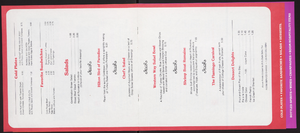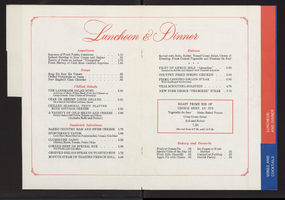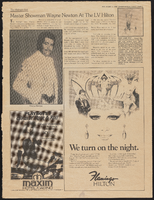Search the Special Collections and Archives Portal
Search Results
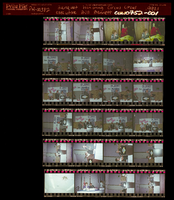
Photographs of banquet honoring Circus Circus executive Bill Bennett, culinary supporter during Frontier Strike, Culinary Union, Las Vegas (Nev.), 1990s (folder 1 of 1)
Date
Archival Collection
Description
Arrangement note: Series III. Internal: Work
Image
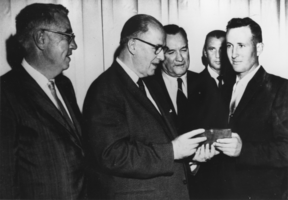
Pahrump Valley rancher Tim Hafen receives the Outstanding Young Farmer Award: photographic print
Date
Archival Collection
Description
From the Nye County, Nevada Photograph Collection (PH-00221) -- Series IV. Pahrump, Nevada -- Subseries IV.F. Hafen Family. The award was presented by the Junior Chamber of Commerce for Governor Charles Russell. U.S. Secretary of Agriculture, Ezra Taft Benson, presented the award. U.S. Senator Molly Malone stands in the background with Beldon Katleman, owner of the El Rancho, at the El Rancho Hotel, Nevada.
Image
Las Vegas PRIDE Parade Records
Identifier
Abstract
The Las Vegas PRIDE Parade Records (2016-2017) contain administrative files that document how the Southern Nevada Association of PRIDE, Inc. (SNAPI) organized the 2016 and 2017 PRIDE parades in Las Vegas, Nevada. Materials include correspondence with event organizers, parade participant information, and PRIDE event guides.
Archival Collection
Janis Walker oral history interview
Identifier
Abstract
Oral history interview with Janis Walker conducted by Claytee D. White on July 03, 2006 for the Boyer Early Las Vegas Oral History Project. In this interview, Walker discusses her career as an African American showgirl in Las Vegas, Nevada during the 1970s and 1980s. Walker describes dancing in the MGM Grand Hotel and Casino productions of
Archival Collection
Loreta Monson oral history interview
Identifier
Abstract
Oral history interview with Loreta Monson conducted by Jon J. Howard on March 01, 1979 for the Ralph Roske Oral History Project on Early Las Vegas. In this interview, Monson discusses moving to Las Vegas, Nevada from Utah for her husband's job. Monson also discusses the growth of Las Vegas over the years. She talks specifically about hotels and casinos. Finally, Monson briefly describes her family life.
Archival Collection
Johnny Eshow Haig Papers
Identifier
Abstract
The Johnny Eshow Haig Papers (1970-1990) are comprised of contracts, agreements, and correspondence of musician Johnny Haig, who worked as a trombone player and conductor at various hotels in Las Vegas, Nevada from 1955 until 2000. Additionally, the papers house extensive original music scores written by Haig. The papers primarily cover Haig’s later career in the 1970s and 1980s.
Archival Collection
Ron Lurie Papers
Identifier
Abstract
The Ron Lurie Papers are primarily comprised of photographs, newspaper clippings, and daily planners from 1972 to 1990 that document Ron Lurie's political career as a city councilman and a mayor of Las Vegas, Nevada. The collection also includes a small amount of correspondence and ephemera, mainly letters that were mailed to Lurie along with photographs. The photographs in the collection depict events and activities that Lurie participated in, and the newspaper clippings document city and state politics in addition to Lurie's political career.
Archival Collection

